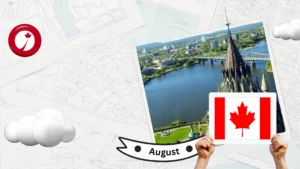Learn about the benefits of immigrating to Canada offered to you and your family by the Free Trade Agreement (FTA) between Colombia and Canada.
Canadian employers can hire professionals and technicians from Colombia who are citizens or permanent residents through the Canada-Colombia Free Trade Agreement.
Work permits issued under this agreement are exempt from the Labour Market Impact Assessment (LMIA), which significantly reduces the time needed for the worker to start working in Canada. Facilitating the arrival of Colombians in Canada to work.
Categories included in the Canada-Colombia Free Trade Agreement
- Business Visitors
- Investors
- Personnel transferred to branches of the company
- Professionals/Technicians
Transferred company personnel are employees of a Colombian company that are transferred to a Canadian company that is in a parent, branch, subsidiary or affiliate relationship with its Colombian counterpart.
Professionals are those Colombian citizens/residents who are offered salaried employment to provide pre-established professional services through a contract between him or her and a Canadian employer, or through a contract between the Colombian employer and a Canadian company. They are usually management executives, or those who possess specialized knowledge.
Technicians must meet the same requirements as professionals as it pertains to the nature of the employment contract. However, the list of eligible positions is determined positively. In other words, only the positions indicated in the so-called “Positive List” are eligible for a work permit.
Eligibility Requirements:
- Be a Colombian citizen or have a Permanent Colombian residence;
- Demonstrate the ability to work in the necessary trade or profession in Canada;
- Be a professional and technician identified under the Canada-Colombia FTA;
- Have a pre-established employment opportunity with a Canadian employer, and
- Meet existing immigration requirements in Canada.
Which professionals are eligible under the Canada-Colombia FTA?
All professionals who meet the general definition of professional are covered, except those professionals who are on an exclusion list.
Excluded Professionals: In general, professionals in the culture industry and those working in the area of health, education and social services are on the list of excluded professionals:
- Managers in health/education/social and community services
- Doctors/dentists/optometrists/chiropractors/other health professions
- Pharmacists, dietitians and nutritionists
- Therapists
- Nurses
- Psychologists and social workers
- University professors and assistants
- Vocational Instructors
- Elementary School Teachers and Counselors
- Managers/directors of libraries, archives, museums and art galleries
- Managers/directors of radio film, television and performing arts
- Creative and performing artists
- Directors of Recreation and Sports Programs and Services
- Telecommunications Managers
- Postal and Courier Service Managers
- Manufacturing Company Managers
- Service Company Managers
- Construction and Transportation Managers
- Judges, lawyers and notaries, except foreign legal consultants
Which technicians are eligible under the Canada-Colombia FTA?
- Civil engineering engineers and technologists
- Mechanical engineering technicians and technicians
- Industrial engineering and manufacturing technologists and technicians
- Construction inspectors and estimators
- Engineering inspectors, testers and regulatory officers.
- Electrical and electronic engineering technicians and technicians (includes electronic service technicians)
- Electricians (including industrial electricians)
- Plumbers
- Industrial instrument technicians and mechanics
- Aircraft instruments, electrical and avionics mechanics, technicians and inspectors.
- Underground production and development miners
- Oil and gas well drillers, servers and testers
- Graphic designers and illustrators
- Interior designers
- Cooks
- Technicians in computer science and information systems.
- International purchasing and sales agents
Supervisors in the following industries:
- Machinists and related technicians who are covered. Occupations
- Printing and related occupations
- Mines and quarries
- Oil and gas service and drilling
- Mineral and metal processing
- Services and processing of oil, gas and chemical products.
- Food, beverage and tobacco processing
- Manufacture of plastic and rubber products
- Processing of forest products
- Textile processing
The following contractors and supervisors:
- Electrical Trades and Telecommunications Occupations Contractor
- Pipe installation shops
- Metal forming
- Carpentry trades
- Mechanical trades
- Heavy construction equipment
- Other construction trades
- Installers, Repairers and Servers
Benefits of the Canada-Colombia FTA?
In addition to not requiring an LMIA, a work permit obtained under the Canada-Colombia FTA makes the spouses of those who come to work in Canada eligible to apply for a work permit. If you are interested in finding out how you can take advantage of the Canada-Colombia FTA agreement or how we can help you book a consultation with one of our certified immigration advisors






